

 |
 |
||||
| Home | Reviews | Extras | Forums |
|
Armitage IIISynopsisThe year is 2046. Detective Ross Sylibus is in the process of being transferred to Mars when a country singer travelling on his flight is murdered. Making matters more complicated is that the singer is discovered to have been a "Third": a robot that looks and feels like a human. Sylibus is subsequently partnered with Armitage, a beautiful but immature cop with a bad attitude. As they investigate the murder of the singer and a seemingly related series of murders of other women on Mars, they uncover a conspiracy that could get them both killed by the Martian government, a situation made more dire when Armitage is revealed to be a Third herself. (Adapted from ANN) ReviewA few years after their release, the original Armitage III OAVs were compiled into a movie entitled Polymatrix, a streamlined version of the story that experienced significant edits, was dubbed into English, and, most importantly, was greatly reduced in length. Having seen the uncut Japanese version, I am somewhat at a loss to explain the rationale behind this move, or at least uncertain of whether it was done for any reason besides concerns related to marketing. If there was ever an OAV series that needed more time rather than less time devoted to its story, it is Armitage III, a good if imperfect cyberpunk tale whose efforts to humanize its cyborgs were, in my opinion, far more successful than those of many its contemporaries. By and large, its problems lie not in its content but in the lack of the time devoted to it, and while it builds to a beautiful story of a robot able to conceive human life, it lacks the space needed for this to be fully realized. Although Armitage III deserved expansion rather than the contraction it received, however, it nonetheless remains an interesting and impressive watch, if a slightly frustrating one, for anyone interested in the metaphysics of artificial life, a specialty of 80s and 90s-era cyberpunk that this show handles particularly well. I will say immediately that I have a great deal of respect for the Armitage III franchise (including its sequel, which I reviewed previously), but I nonetheless must admit to having certain reservations about it that are not slight, as they have the potential to ruin the experience for some and therefore cannot be disregarded. Primarily, the visual aspects of this show have aged extremely poorly, with its apparent shoestring budget making for downright dreadful animation throughout and frequent moments of blurriness and terrible resolution. The ambience of Armitage III, meanwhile, represents an attempt to develop a cold and highly futuristic atmosphere that was foiled by the creators' inability to grab the viewer's eye with any of their attempts, with its vision of a colonized Mars coming across as a bland dilution of Blade Runner's take on Los Angeles. Needless to say, this show is not best appreciated via its aesthetic aspects, and while the character design is at least pleasant enough, the faded color scheme and occasionally odd distortions of body proportion are often distracting. Armitage III is quite heavy on fan service, meanwhile, for the title character's outfit is indeed quite revealing (if tame by today's standards) and resembles something one would wear in an adults-only title. The fanservice, as well as the absence of it later on, may serve something of a purpose in that it disappears as Armitage evolves into a more mature character (a point I shall soon address), but it is nonetheless distracting and still felt needless to me. As a result of it, the show comes away looking somewhat trashier than it is at its heart. 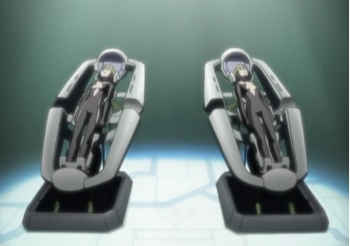 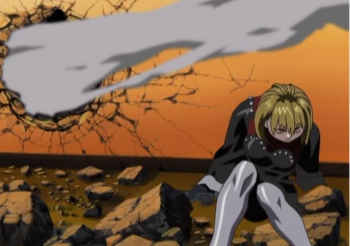 Keeping these flaws in mind, the overarching themes of Armitage III are far more interesting than either its aesthetic or the oft-used "cyberpunk" ambience would necessarily indicate. Armitage herself, who initially seems to be a carefree and playful figure, undergoes a process of evolution that few other cybernetic anime leads do, for while a considerable amount of her character arc is dedicated to her desire to reunite with her creator and understand her past, as frequently occurs in these stories, her ability to redirect the focus of her existence beyond that allows her to escape this trope. Indeed, the final episode, which provides the details of this transition (and which unfortunately would require spoilers to discuss in depth) stands as one of my favorite individual episodes of anime, with its discussion of humanity's inclination towards using what it might use for good for ignoble purposes being very poignantly portrayed. Cleverly, the series makes a false protagonist out of Ross, who initially appears as a stoic character, possibly the only level-headed personality in the show, who is irritated by and indifferent to Armitage's silly antics, and yet the initial eye-rolling vanishes as we learn that Armitage in fact has a profound sense of what the deaths of the other cyborgs entail for her and has the best understanding of any character of how humans have arbitrarily segregated themselves from their creations. Indeed, Armitage as a childish and playful character and Armitage as a sobered veteran are similar enough for this transition to be believable, and the aforementioned reduction in the fanservice and simultaneous shift from an episodic format to a narrative represent a maturation of the story. Though quite heavy on action scenes, it is surprisingly best enjoyed when watched in contemplation, with the space to think and mull it over, as its successful deconstruction of human arbitrariness and the potential for self-awareness in artificial life make it far more interesting a cyberpunk series than its relative lack of name recognition among anime fans today would suggest. Armitage III, however, needed several more episodes than it received for this potential to be fully exploited. For one thing, while the transition from the more "episodic" aspect to the climax is fairly smooth, it lacks sufficient time to prove what exactly it was doing with this self-contained aspect, as the series' most interesting elements are largely confined to the running time of the longest and last OAV. Indeed, Armitage III also suffers somewhat from its inability to develop its recurring antagonist, D'Anclaude, into anything more than a cackling megalomaniac, and while the last part of the series, which is more conceptual, survives by relying more on a discussion of the effects of a conflict with society rather than an immediate conflict with a villain, his presence during the first three OAVs, where he is most needed, is uninspiring. Frustrating, too, is the relative lack of details regarding the society outlined in this series, which could have added a great deal to the story if the show had simply had more time to cover them. Regardless, Armitage III is still an entertaining watch even if some of its less impressive moments, but the rushed pace of the action scenes and rapid shift in tone within such a short period of time are redeemed largely by the intelligent musings of the final episode, without which this OAV would likely have entirely been forgotten. 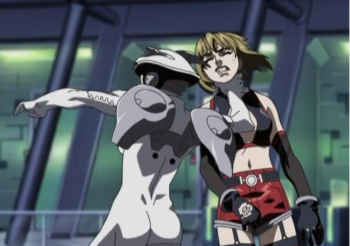 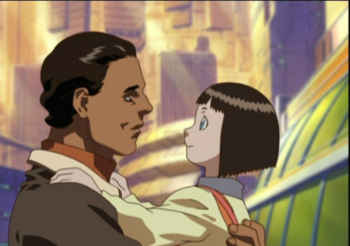 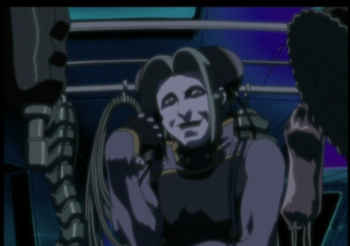 In the end, I recommend Armitage III based on what good it does do with its unique elements and can forgive it for being incomplete in some aspects. Though I remain somewhat incredulous that this story was edited further, some positive reviews of the film that I have seen indicate that this process may have improved it by streamlining its early portions. That is a valiant effort to fix a good but frustrating series, and yet it does not compare to the greatness this show might have attained had it been given the space to develop that it deserved. A fairly weak four stars, kept at that by the strength of the fourth episode and how interesting some of its conclusions are. Remove a star if you don't care for science fiction and maybe add one if you're especially fond of older anime. — Nicoletta Christina Browne Recommended Audience: Best for older teenagers and above. Armitage's outfits lean on the skimpy side (she should seriously think about putting a shirt on), and while this lessens later on, there are several shots of bare nipples in the last episode. This OAV is also fairly violent, meanwhile, and the damage inflicted on some of the robots is often both graphic and disturbing to watch. Version(s) Viewed: Stream courtesy of Hulu.com (Japanese with English Subtitles) Review Status: Full (4/4) Armitage III © 1995 AIC / Pioneer LDC |
 |
|
| © 1996-2015 THEM Anime Reviews. All rights reserved. |